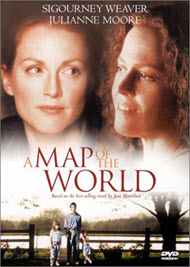A Map of the World
 for some sexuality and language.
for some sexuality and language.
Reviewed by: Brett Willis
CONTRIBUTOR
| Moral Rating: | Very Offensive |
| Moviemaking Quality: |
|
| Primary Audience: | Adult |
| Genre: | Drama |
| Length: | 2 hr. 5 min. |
| Year of Release: | 1999 |
| USA Release: |
January 21, 2000 |



nervous breakdown / Alice Goodwin: “I am trying to have a complete nervous breakdown, and no one will let me do it in peace!”
FORNICATION and ADULTERY in the Bible
I think I was sexually abused, but I’m not sure. What is sexual abuse, and what can I do to stop the trauma I am facing now? Answer
SELF-MUTILATION—Help for Cutters (and others who self-injure in some way)
Does God feel our pain? Answer
Why does God allow innocent people to suffer? Answer
| Featuring |
|---|
|
Sigourney Weaver … Alice Goodwin Julianne Moore … Theresa Collins David Strathairn … Howard Goodwin Chloë Sevigny … Carole Mackessy See all » |
| Director |
|
Scott Elliott |
| Producer |
|
Cinerenta Medienbeteiligungs KG The Kennedy/Marshall Company See all » |
| Distributor |
| Alpha Media, First Look Pictures and Cinerenta Gesellschaft für Internationale Filmproduktion mbH |
Of the major film genres, straight drama is the hardest to get production funding for in America because it won’t attract any “teen money.” This film, apparently bankrolled from both sides of the Atlantic, paid for seasoned actors and authentic detailing; the result is a quite well-crafted piece.
Alice Goodwin (three-time Oscar nominee Sigourney Weaver) is a city girl who’s become a farm wife in Racine County, Wisconsin (between Milwaukee and Chicago), in the fictitious little town of Prairie Center. Besides running the house, helping on the farm, caring for her two little girls and dealing with not-always-communicative husband Howard (David Strathairn), she’s also a school nurse. Although that’s a pretty full plate, she seems to have it all under control; but appearances can be deceiving. After an unfortunate incident one day while she’s watching the children of her friend Theresa Collins (Julianne Moore), one thing leads to another and Alice’s whole world begins to fall apart. Without giving away the plot, the mature themes include: marriage and family problems including the loss of a child; accusations of abuse (with a gossipy, presumed-guilty attitude from the townspeople, reminiscent of “A Cry in the Dark”); racial prejudice and tension; and some very complex relationships—both positive and negative—between women.
The 50-year-old Weaver gives her character an amazing range of emotion, mood, and development. In fact, the acting is first-rate all around, with a large part of the story told subtly rather than overtly; even the young children are convincing (part of me wishes that one child would have been less convincing when telling her parents “I hate you”). Moore is excellent. Arliss Howard, who played John Hammond’s nephew in “The Lost World” and Senator John C. Calhoun in “Amistad,” gives a notable performance in a small part as Alice’s lawyer.
I’m a Wisconsinite, and the farm setting is flawlessly authentic from the old wood stove to the messy dairy barn and the Holstein-Friesian cattle (90% of Wisconsin’s dairy herd). The hospital, jail and courtroom settings are also well done.
Content Warnings
The entire plot is mature subject matter; on top of that, the director chose to inject mature imagery. The profanity is extreme in spots. There are occasional scenes of confrontation and violence, including racially-based ones in the jail setting (although Alice’s little town is “white,” most of the female inmates at the overcrowded Racine County Jail are black; this demographic is another authentic touch by someone who knows the area well).
There are a couple of annoying simulated sex scenes with full or partial nudity. They aren’t graphic, and aren’t particularly erotic either (at least not to someone my age). They’re apparently meant to show a middle-aged couple who’ve been together so long that they could find each other blindfolded. But sexual nudity is ALWAYS gratuitous; the story could have been told just as effectively in some other way. However, society seems to have reached a point where filmmakers say “Why bother?”.
One other warning: the Goodwins and Collinses are (initially) good friends, who sometimes get together for drinks. At one of those get-togethers (seen later on a home video), it appears that the two women are also smoking marijuana.
Although this film has a lot of merit, I have reservations in recommending it to anyone except possibly happily-married adults who are used to strong fare.


PLEASE share your observations and insights to be posted here.